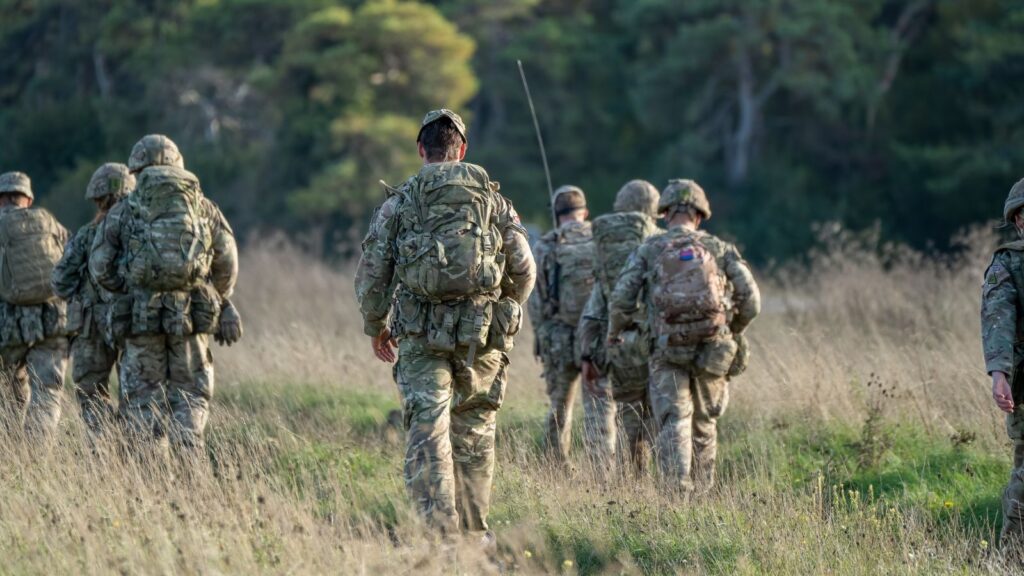Military service isn’t as popular with young Brits as it once was, and the idea of serving in the armed forces has seen a decline, with many opting for other paths instead.
Changing Career Aspirations

Many young Brits today have different career aspirations compared to previous generations. Thanks to technology, creative industries, and a global job market, there are countless opportunities that offer more stability, financial reward, and personal fulfilment than military service.
Growing Awareness of Mental Health

In recent years, there has been a significant shift in how mental health is perceived and prioritised, and the potential psychological impact of military service, including the risk of PTSD and other mental health issues, is a major deterrent for many young people. They are more informed about the challenges faced by veterans and the long-term effects that military service can have.
Fear of Physical Harm

The fear of physical injury or even death is a considerable factor dissuading people from joining the military; with conflicts still ongoing in various parts of the world, the risk of being deployed to dangerous environments is real. Many young Brits are not willing to take the chance of suffering life-changing injuries or losing their lives.
Changing Perceptions of Patriotism

Patriotism isn’t as straightforward as it used to be. For many young people in Great Britain, the concept of serving one’s country doesn’t necessarily equate to joining the military. They might express their patriotism through other means, such as volunteering in their communities or pursuing careers in public service.
Desire for Personal Freedom

A significant priority for many today is personal freedom, and military life is highly regimented, with strict rules and a rigid hierarchy. For a generation that values flexibility, autonomy, and the ability to make their own choices, the idea of being bound by military discipline can be unappealing.
Political Disillusionment

Disillusionment with politics and government is another reason why many young Brits are avoiding military service. Some feel that military actions are often driven by political agendas they don’t agree with, or that wars are fought for reasons they don’t support.
The Rise of Anti-War Sentiments

Particularly among younger generations, anti-war sentiments have been growing, and a high number of young Brits are strongly opposed to war and the idea of violence as a solution to global conflicts. These pacifist ideals are at odds with the fundamental nature of military service, leading many to reject the idea of joining.
Focus on Education and Career Development

Education has become a top priority for many young people in the United Kingdom. With an increasing number of students pursuing higher education, there is a strong focus on academic and professional development, and a lot see military service as a disruption to their educational and career goals.
Economic Considerations

The economic benefits of military service are not as appealing as they once were, and a high number of people believe they can achieve financial security through other means, such as entrepreneurship or skilled trades. The relatively modest pay of military personnel compared to potential earnings in the civilian job market makes military service less attractive.
Influence of Social Media

Social media plays a significant role in shaping the opinions and choices of young people, and the portrayal of military life on platforms like Instagram, TikTok, and Twitter often focuses on the hardships, dangers, and sacrifices involved. While there are positive stories too, the negative aspects can have a more substantial impact.
Lack of Personal Connection to the Military

For many of the younger generations in the UK, the military feels distant and unrelated to their everyday lives. With fewer family members or friends serving in the armed forces, they lack personal connections to the military, making it less likely that they would consider it as a viable option.
Increasing Diversity of Opportunities

Having access to an unprecedented variety of opportunities means that many young people have more opportunities, such as working in international NGOs or starting their own businesses. This diversity of options makes military service just one of many choices—and often not the most appealing one.
Changing Views on Masculinity and Gender Roles

Traditional views of masculinity and gender roles, which often emphasised toughness, physical strength, and a duty to serve in the military, are evolving. Today’s young men and women are redefining what it means to be strong and successful, and many reject the idea that military service is a necessary rite of passage.
The Appeal of Travel and Adventure Without the Military

While the military has traditionally been seen as a way to travel and experience adventure, today’s young people have other means to achieve these goals. With budget airlines, working holidays, and digital nomad lifestyles, the world is more accessible than ever before.
Environmental Concerns

Environmental awareness is a growing priority for a lot of the younger generations, and some are put off by the environmental impact of military operations. Whether it’s the carbon footprint of military vehicles or the environmental damage caused by conflicts, the military’s impact on the planet is a concern for the environmentally conscious.
Impact of Previous Conflicts

The lasting impact of previous conflicts—particularly the wars in Iraq and Afghanistan—has left a mark on public perception of the military. Many young Brits have grown up seeing the toll these conflicts have taken on soldiers, both physically and mentally.
Emphasis on Work-Life Balance

Work-life balance is a significant consideration, as the demands of military life, which can involve long deployments, extended time away from family, and a high level of stress, are at odds with the desire for a balanced and fulfilling life. Many young Brits value their personal time, relationships, and hobbies too much.
Family Influence

Finally, family influence plays a crucial role in the decision-making process for many young people. Parents who have experienced military life, or who have strong opinions about the armed forces, often pass these views on to their children, and in some cases, this could mean discouragement from joining the military.







